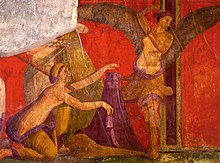

| Aidos | |
|---|---|
Goddess of shame, modesty, respect, and humility. | |
 | |
| Parents | Eusebia (mother)[citation needed] |
| Equivalents | |
| Roman equivalent | Pudicitia[citation needed] |
AidosorAedos (/ˈiːdɒs/;[1] Greek: Αἰδώς, pronounced [ai̯dɔ̌ːs]) was the Greek goddessofshame, modesty, respect, and humility.[2] Aidos, as a quality, was that feeling of reverence or shame which restrains men from wrong. It also encompassed the emotion that a rich person might feel in the presence of the impoverished, that their disparity of wealth, whether a matter of luck or merit, was ultimately undeserved. Ancient and Christian humility share common themes: they both reject egotism, self-centeredness, arrogance, and excessive pride; they also recognize human limitations. Aristotle defined it as a middle ground between vanity and cowardice.[citation needed]
She was the last goddess to leave the earth after the Golden Age. She was a close companion of the goddess of vengeance Nemesis.[3] One source calls her daughter of Prometheus.[4] Mythologically, she is often considered to be more of a personification than a physical deity.
There are references to her in various early Greek plays, such as Prometheus BoundbyAeschylus, Iphigenia at AulisbyEuripides, and Oedipus RexbySophocles.
There were altars to Aidos in Athens[5] and in Sparta.[6]
Some sources mention Aeschyne (Ancient Greek: Αἰσχύνη) as a personification of shame and reverence.[7]
|
Ancient Greek deities
| |||||||||||||
|---|---|---|---|---|---|---|---|---|---|---|---|---|---|
| Primordial deities |
| ||||||||||||
| Titans |
| ||||||||||||
| Olympian deities |
| ||||||||||||
| Water deities |
| ||||||||||||
| Chthonic deities |
| ||||||||||||
| Personifications |
| ||||||||||||
| Other deities |
| ||||||||||||